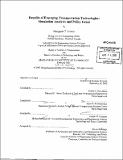Benefits of emerging transportation technologies : simulation analysis and policy issues
Author(s)
Cortes, Margaret T. (Margaret Therese), 1974-
DownloadFull printable version (6.739Mb)
Other Contributors
Massachusetts Institute of Technology. Dept. of Civil and Environmental Engineering.
Advisor
Moshe E. Ben-Akiva and Haris N. Koutsopoulos.
Terms of use
Metadata
Show full item recordAbstract
This thesis explores the quantification of transportation technology benefits, through simultaneous consideration of technical and policy issues. Benefits are first defined and identified based on current literature and discussions. Key benefits include delay impacts, safety impacts and environmental concerns. A key element of such quantification and analysis is traffic simulation. MITSIMLab, a microscopic traffic simulator, has been recently enhanced to replicate transportation technologies and applications such as traffic signal priority and advanced vehicle location for transit. In addition, the existing capability for modeling incident detection and management is reviewed. These applications are tested on a traffic network on Stockholm, Sweden, about to undergo new construction and development. The implementations are demonstrated to be effective in a quantitative and qualitative manner, and successful in illustrating the benefits of signal priority for transit as well as the integration of different technologies in the simulation itself. Through the case study, this capability is contrasted with the ability of MITSIMLab to depict impacts of infrastructure changes. Benefits quantification is discussed through post-processing MITSIMLab output measures such as travel time statistics. Benefits evaluation is necessarily intertwined with policy development. The technical analysis of the Stockholm network is framed with an investigation of transportation policy issues in the US and Sweden. Fundamental policy issues of stakeholder cooperation, technical integration and regional integration are identified, then explored in the context of benefits evaluation.
Description
Thesis (S.M.)--Massachusetts Institute of Technology, Engineering Systems Division, Technology and Policy Program; and, (S.M. in Transportation)--Massachusetts Institute of Technology, Dept. of Civil and Environmental Engineering, 2003. Includes bibliographical references (p. 96-98).
Date issued
2003Department
Massachusetts Institute of Technology. Department of Civil and Environmental Engineering; Massachusetts Institute of Technology. Engineering Systems Division; Technology and Policy ProgramPublisher
Massachusetts Institute of Technology
Keywords
Technology and Policy Program., Civil and Environmental Engineering.